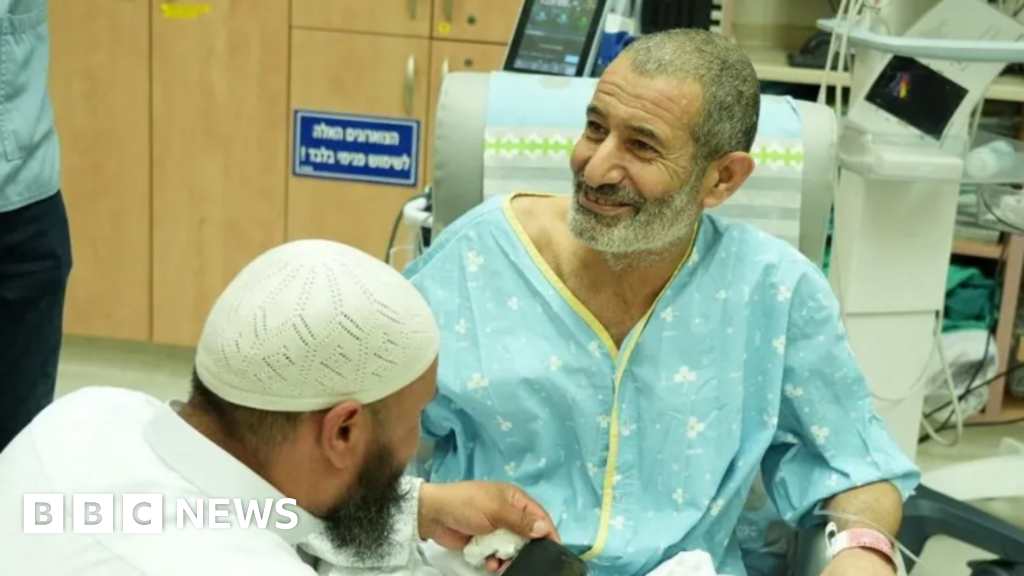A Bedouin Arab hostage rescued from an underground tunnel in the Gaza Strip said one of his fellow detainees died next to him during his captivity, a former Israeli official said.
The Israeli army said Kaid Farhan El-Khadi was rescued on Tuesday during a “complex operation in the southern Gaza Strip.”
Elkadi has yet to speak publicly, but the former mayor of a town in southern Israel said the 52-year-old had barely seen any sunlight for eight months.
Elkadi’s cousin also said that his father did not receive any special treatment during his incarceration despite being Muslim.
El Kadi was kidnapped by Hamas during an Israeli attack on October 7 and became the eighth hostage rescued by Israeli forces since the start of the war in Gaza.
The father of 11 is being examined in hospital and is in a stable condition.
Ata Abu Medigham, a former mayor of the southern Israeli city of Rahat, told Israel’s Haaretz newspaper that Elkadi had told relatives about “tough days and very cruel captivity.”
“He talked about one of the hostages he was held captive with for two months and who died next to him,” Medigham said.
Medigham added that Elkadi had begun to worry about losing his eyesight.
“He was checking to see if his eyes were still moving and functioning. He was holding his fingers up to his eyes to check his reflexes.”
The Israeli army said it found Elkadi “alone” inside the tunnel.
In a statement, the military said it could not release details about the rescue “due to considerations of the safety of the hostages, the safety of our troops and national security.”
But some details are beginning to emerge about Elkadi’s time in captivity.
Fadi Abu Sahiban, Elkadi’s cousin, said his father had not received preferential treatment because he was Muslim.
“They didn’t make concessions because he is a Muslim. They say he is allowed to pray, but that is the only thing he is allowed to do,” he told Haaretz.
Elkadi had no way to contact the outside world and lived in constant fear of bombs flying overhead, his cousin said.
“We could hear the constant sound of IDF artillery fire and our bodies were shaking,” Abu Sahiban said.
“He was convinced that every day was his last, not only because of his captors but also because of the military bombardment. He said that every day was a life-threatening situation.”
“I have been waiting for this moment, I swear to you,” Elkadi said in a phone call with Israeli Prime Minister Benjamin Netanyahu from the hospital, adding: “There are others who are waiting.”
Elkadi is a grandfather of one and comes from a Bedouin village in the Rahat region of the Negev Desert.
He had worked for many years as a security guard at the Magen Kibbutz near the Israel-Gaza border, where he was kidnapped 10 months ago.
The Israeli military launched an operation to destroy Hamas after unprecedented attacks in southern Israel on October 7 left some 1,200 people dead and 251 taken hostage.
More than 40,530 people have been killed in Gaza since then, according to the Hamas-run Gaza Strip Health Ministry.
Intermediaries from the United States, Egypt and Qatar are trying to broker a ceasefire in which Hamas would release the 104 hostages still being held, including 34 believed to be dead, and free Palestinian prisoners being held in Israeli prisons.
Indirect talks have been taking place in Cairo in recent days but so far there have been no signs of progress on key issues, including Netanyahu’s demand that Israel station troops along the Gaza-Egypt border, which Hamas has rejected.
Among the remaining hostages are two Bedouin Arabs, Yousef Zayadna and his son Hamza, who are still alive, and the body of a third, Mohammed el-Atrash, who remains in Hamas custody.
Another Bedouin, Hisham al-Sayed, has been held captive in Gaza since 2015.



